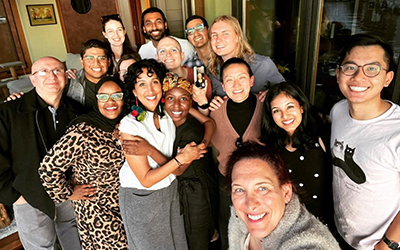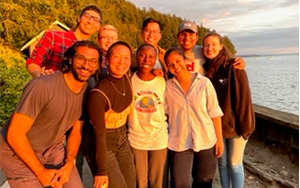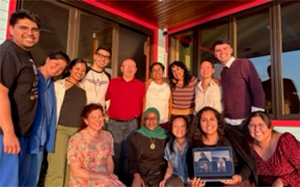Health Equity Track



What is the Health Equity Track?
Mission: To train a diverse group of pediatric residents to advance health equity for children and communities who are underserved and/or marginalized through collaborative clinical care, activism, community partnership, advocacy, quality improvement, research and education.
The University of Washington/Seattle Children's Pediatric Residency Health Equity Track is designed to train the next generation of leaders and transformative thinkers in pediatric health equity across the clinical care spectrum. There are four priorities of the HET: education/training, mentorship, work on a meaningful project, and community building. Throughout their three years of training, residents will have seven dedicated months to focus on growing skills to recognize the roots of health inequity and effectively strategize to mobilize resources and interventions to advance health equity and justice for our children, adolescents, and communities. Residents in the Health Equity Track will develop meaningful work within their preferred area of focus, including, but not limited to public health, legislation, policy, media advocacy and community-based activism and research. Residents will have the opportunity to partner and learn from leaders within the community as well as within academic medicine in their work and through a dedicated curriculum, gatherings/retreats, and mentorship. Mentorship from faculty is an integral part of the experience and will be tailored to meet the needs of each individual resident. Emphasis will also be placed on personal growth and development, including opportunities for self-reflection, inquiry, and exploration of personal histories. Some of the interests/work that our residents have engaged in are: developing curricula to counter race-based medicine, partnering with teens that are gender diverse and unstably housed to improve their health outcomes, various community health projects with a local refugee community, bringing community organizing principles into clinic spaces, partnering with faculty to bring structured anti-racism mentorship to trainees, etc.
Why choose the Health Equity Track?
You are interested in becoming a leader in the field of pediatric health equity and are seeking dedicated training in recognizing and addressing structural causes of health inequity, including the development of leadership and advocacy skills, formation of community partnerships, understanding how to mobilize resources to create effective change, and becoming part of a community of pediatricians dedicated to advancing health justice.
You are interested in building inclusive partnerships with community members and organizations to advocate for communities that are furthest from health justice with a liberatory and anti-oppression lens.
You have lived experiences in health or other social inequities, and you are motivated to reflect and build on your personal strengths to become a leading voice of change.
How will residents’ time be spent?
During the first year (PGY1), residents will have two months focused on building advocacy and clinical skills, developing community partnerships, and learning strategies to develop and evaluate sustainable interventions for child health. One month per year will be a dedicated curriculum month focused on the interests and needs of the residents within the health equity track with daily sessions with local and national experts covering topics such as: theoretical frameworks, care of special populations, research/QI methodologies relevant to health equity, building advocacy skills, and mental health/self-exploration sessions. Longitudinal mentorship is incorporated across the three-year training program.
Residents will build their continuity clinic patient panels in partnership with Odessa Brown Children’s Clinic (OBCC), SeaMar Community Health Centers, and the Pediatric Clinic at Harborview. Residents are also encouraged to explore the impact and role of health equity across the clinical care spectrum, regardless of their ultimate career trajectory.
The second and third years (PGY2 and PGY3) will be focused on meaningful work or scholarship development and implementation. Residents will have three months of protected time each year to dedicate to this.
As in our categorical program, our Health Equity Track residents will also participate in our WWAMI rotation during the PGY2 year. This rotation gives our trainees the unique opportunity to gain first-hand experience with primary care in the rural setting and to better understand the needs of patients outside of the greater Seattle area.
The remaining months across the three years of residency will be focused on inpatient and intensive care medicine, subspecialty electives and ED rotations at Seattle Children’s Hospital, Harborview Medical Center and the University of Washington.
HET residents are not eligible to participate in other tracks within our training program, such as the REACH track. The dedicated time allotted to the Health Equity Track does not allow for participation in other tracks. Additionally, the goals of our track do not include global health work, as that does not fit within the mission of exploring health equity within our domestic context.
Primary Training Sites
Odessa Brown Children’s Clinic (OBCC)
Odessa Brown Children’s Clinic (OBCC) is an inner-city community clinic of Seattle Children’s Hospital providing medical, nutrition, dental and child behavioral health services to children and adolescents. The clinic was built during the Civil Rights Era of the 1960s to serve the African American community of Seattle’s Central District with the vision of “quality care with dignity.” OBCC continues to predominantly serve diverse, low-income communities including immigrants and refugees and families facing homelessness, participating in treatment programs or in the foster care system. The clinic is also home to Seattle Children’s Sickle Cell Program and a site for providing gender-affirming care. OBCC has two locations in Seattle’s Central District and Othello neighborhood. Clinic faculty are faculty of the University of Washington Division of General Pediatrics and are actively involved in advocacy efforts for patients and families in the community surrounding OBCC.
The Children’s Clinic at Harborview
The Pediatric Clinic at Harborview is located at Harborview Medical Center, a 400-bed public hospital owned by King County, governed by a county board of appointed trustees and managed by the University of Washington. Harborview Medical Center is the Level 1 burn and trauma center for the WWAMI region, and the location of many patient-centered medical homes across the lifespan. The Pediatric Clinic is an active, multidisciplinary outpatient primary care clinic that is a patient-centered medical home for many diverse populations, including those who are low-income, facing homelessness, in foster care, speak a language other than English or are immigrants or refugees. The clinic also is Washington’s first Foster Care Center of Excellence, home to the Traumatic Brain Injury Clinic, and the pediatric arm of the Refugee Health Promotion Project. Clinic providers are faculty of the University of Washington Division of General Pediatrics and are engaged in research, policy, public health and advocacy efforts in partnership with community organizations and families to improve the safety, health and well-being of the community.
Sea Mar Community Health Centers
Founded in 1978, is a community-based organization committed to providing quality, comprehensive health, human, housing, educational and cultural services to diverse communities, specializing in service to Latinos in Washington state. Sea Mar proudly serves all persons without regard to race, ethnicity, immigration status, gender, or sexual orientation, and regardless of ability to pay for services. Sea Mar's network of services includes more than 90 medical, dental, and behavioral health clinics and a wide variety of nutritional, social, and educational services.
University of Washington Medical Center
The University of Washington (UW) Medical Center is a 260-bed university hospital that is home to our Level IV Neonatal ICU and Newborn Nursery.
Seattle Children’s Hospital
Seattle Children’s Hospital is a 364-bed hospital located serving the children of Washington, Alaska, Montana and Idaho. It is the primary inpatient training site for our pediatric residents and is also home to numerous specialty outpatient clinics. Faculty at Seattle Children’s Hospital also have faculty appointments at the University of Washington and are involved with care of children across the Pacific Northwest.
How do I apply to the Health Equity Track?
As with the other individualized training tracks (Alaska, Neurology, Research, Medical Genetics) of the UW Pediatric Residency program, the Health Equity Track residents will be firmly integrated within the categorical program and are a part of the larger family of the pediatric residency program.
Given the dedicated time allocated to community-based projects and skill building, there is a separate match number to apply to the Health Equity Track. To be considered for both the categorical program and the Health Equity Track, you must apply to each separately using their individual match numbers.
Please follow the instructions on how to apply to the University of Washington/Seattle Children's Pediatric Residency Program.
Program Leadership
- Troy Johnston, MD Residency Program Director, Pediatric Cardiology
- Sabreen Akhter, DO, Director, Health Equity Track, Pediatric Emergency Medicine
- Anisa Ibrahim, MD, Site Director, Harborview Clinic, Primary Care Pediatrics
- Vaidehi Pidaparti, MD, Core Faculty, Primary Care Pediatrics
- Davia Loren, MD, Core Faculty, Care of Transgender/Gender Diverse Children
- Tracy Seimears, MD, M.Ed, Associate Program Director, Pediatric Hospitalist Medicine
- Chinenyenwa Mpamaugo, MD, MPH, Executive Resident
- Isabella Dahlgren, MD, Executive Resident
